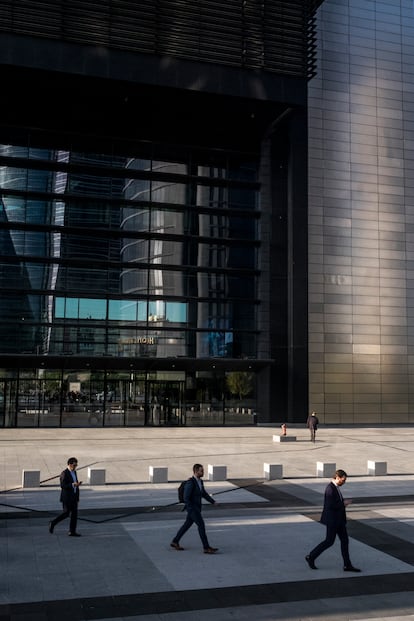It is possible that if you have reached a certain socioeconomic position, have achieved social recognition, a good salary or a large heritage, what we know as success, you think that it has been exclusively on your own merits.
Bad news: it is also very possible that it is not so.
In the life event of each one, effort counts, of course, but effort is only one more factor where we must also count others that are beyond our control or will: the cradle, luck or talent.
Life is a raffle, Marisol already sang it, and she also has a lot of inheritance and contacts.
More information
Meritocracy: The American Dream Trap
Meritocracy and other psychological mechanisms that serve as an excuse against taxes
A system where everyone gets what they deserve thanks to hard work is called meritocracy. It sounds good, and many times we are told that we live in one, or that, at least, that would be desirable. But several experts consulted for this report warn: neither meritocracy exists in our societies, nor is it clear that its existence will bring us virtue. In recent decades, the gap between winners and losers has widened, generating more polarized and unequal societies in income and wealth. The conceptualization of success has also changed: "Those who have reached the top believe that their success is their doing, evidence of their superior merit, and that those left behind equally deserve their fate," explains the Harvard University philosopher. Michael Sandel,2018 Princess of Asturias Award for Social Sciences and author of the book
The tyranny of merit
(Debate).
The reality is that things are not so simple and equal opportunities do not operate.
"Since the beginning of the century a worse operation of our social elevator has been detected", reads the
Spain 2050
report
prepared
by the Government of Pedro Sánchez.
"In Spain, being born into low-income families conditions educational and professional development opportunities to a greater extent than in other European countries."
It is not the same to be born in a poor neighborhood in Madrid like Vallecas, for example, than in a rich neighborhood like La Moraleja.
It is not the same to be born in a developed country where you can build a successful career than in a poor country where everything is more difficult.
The strokes of luck are often crucial in the trajectory of the people.
Talent has a very good reputation, but it is not even deserved, it is innate.
It is not enough for you to have talent, you have to discover it and find the right environment for its development.
Furthermore, one's talent must be appreciated by the market: it is not the same to have a talent to play football, like Lionel Messi, than to have a talent to play badminton.
If you want to support the development of news like this, subscribe to EL PAÍS
Subscribe
"The talent and effort produced little in the
absence of a well developed social environment ,
" says economist at Cornell University Robert H. Frank, author of the book
Success and Luck: Good Fortune and the Myth of Meritocracy
(
Success and luck: good fortune and the myth of meritocracy
), which also points to one of the pernicious effects of meritocracy: "People who overlook the contribution to their success of an enabling environment are less willing to support the public investments necessary to maintain that environment." In this sense, meritocracy can corrode social policies or the welfare state, designed precisely to balance the social terrain and reduce inequalities. Inheritance tax, another way of rebalancing society by filing inheritances, is frequently dismissed (sometimes by regular advocates of meritocracy). If a society is legitimized where the few who win take it all, if that seems fair and natural, the redistribution of wealth and social justice is delegitimized."The idea of meritocracy is used to make a deeply unequal social system seem 'fair' when it is not," says University of London sociologist Jo Littler, author of
Against Meritocracy: Culture, Power and Myths of Mobility
(
Against meritocracy: culture, power and myths of mobility
).
The nonexistent meritocracy is frequently greased with the fertile ideas of the myth of entrepreneurship,
coaching
or positive thinking (the
happycracy
described by Eva Illouz and Edgar Cabanas): you can achieve what you propose, you must undertake, you must leave your comfort zone and break your limits. It is a doctrine of current capitalism that prioritizes individualism and competition especially, under the meritocratic idea that the one who works the most will be the one who achieves the most: the path to success is usually a solitary struggle against others. , which has not much to do with collective progress. The media and bookstore shelves are full of moralizing examples of self-improvement and manuals for the ascent to the top, many times starting from the most adverse conditions. Whoever is doing poorly or regularly can only think that something is not working with himself,beyond the structural problems of society, which can lead to anxiety, discouragement or resentment.
Interestingly, the meritocracy has been praised by both liberal or conservative politicians and progressives. The right wing has widely praised "the Spain that rises early." In Barack Obama's speeches it is easy to find praise for personal effort as a way to prosper in life. "The idea that we live in a meritocracy in which 'anyone can do it' has been expressed, for example, by progressives, anti-racists and feminists, but at the same time very pro-capitalist," says sociologist Jo Littler. This idea is essential, he argues, for the socially progressive neoliberal stance of companies that favor "equal opportunity" among their employees or for the policies of Bill Clinton and Tony Blair. “For Conservatives, Merit Maintains the
Status Quo
substantially intact, while being presented as fresh and open: this is key to the right-wing versions of the meritocracy, ”says Littler.
Several men go to his workplace in the Cuatro Torres area of Madrid.
In the background, the Cepsa tower.David Exposito
In its origins, the meritocracy made sense: with it, the aristocratic system that has dominated most of human history was demolished, that in which privileges are inherited from generation to generation, channeled by parameters such as class, race, caste or gender.
"It allowed people will
advance not based on their upbringing, but in their own accomplishments ,
" says the lawyer Yale University Daniel Markovits, author of the book
The Meritocracy Trap
(
The trap of meritocracy
). "Because no caste or class has a monopoly on effort and talent (and since the old aristocrats were not especially hardworking or capable), the meritocracy helped dismantle the aristocratic hierarchy." For a while it seemed like a good idea. It then became, in the eyes of Markovits, a trap that traps the rich in an endless race for their descendants to have the best academic training (as evidenced in the recent scandal of millionaires who paid fortunes to sneak their children in the best universities in the United States, as reflected in the documentary
The
Varsity Blues
plot
, on Netflix). This race excludes the poor, who, beyond the discursive plane, will hardly be able to fulfill the meritocratic ideal, that is, the American dream.
But even if meritocracy existed, it might not be desirable: “It is corrosive to the common good,” notes philosopher Michael Sandel, “it offers everyone the opportunity to climb the ladder of success without noticing that the rungs of the ladder can be more and more separated. And it assumes that society is a race with winners and losers ”. According to the philosopher, this way of thinking creates arrogant elites and humiliated and resentful popular classes, who have been told that they are not good enough. Hence, according to Sandel, reaction phenomena against the elites such as Trump's populism or Brexit. Because that's the dark side of meritocracy: if you don't succeed, you're not worth it, it's all your fault.
To do? Inequality, which finds justification in meritocratic ideas, is, together with climate change, one of the greatest threats to the stability of the system, as many voices point out even from the very heart of capitalism: it leads to social polarization, to the boom of totalitarianism and the popular discredit of liberal democracies. But "the vicious circle that has inflated growing meritocratic inequality can be replaced by a virtuous circle that ensures democratic equality for all," Markovits notes. To alleviate this inequality, it is essential to achieve an efficient public education that reaches all strata of society, as well as the reduction of unemployment and the disappearance of precarious jobs,at a time when the technological acceleration is complicating the labor market, and at the same time that basic incomes are proposed to maintain social cohesion. An idea that is gaining more and more strength (for example, in the ideas of US President Joe Biden): "The best political response to the inequality produced by luck is to achieve greater public investment, taxing the rich more," he concludes the economist Robert H. Frank.
Subscribe here
to the weekly Ideas newsletter.



/cloudfront-eu-central-1.images.arcpublishing.com/prisa/CW54DGOQTBBXDEI5DHJNBD5WGE.jpg)




